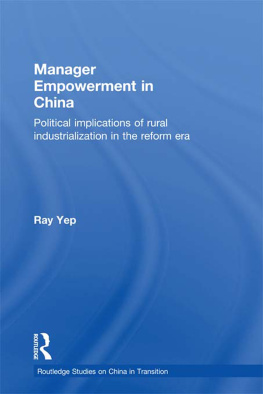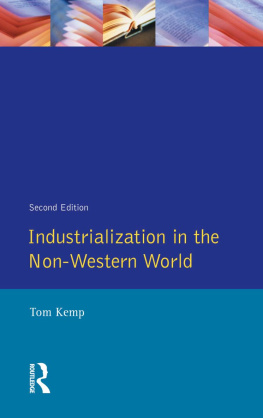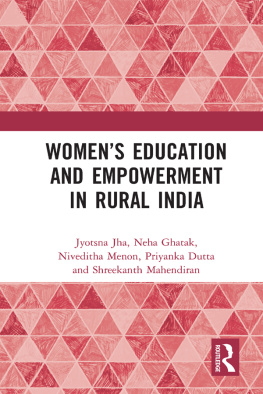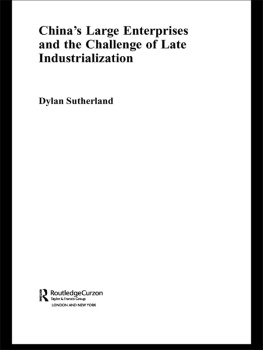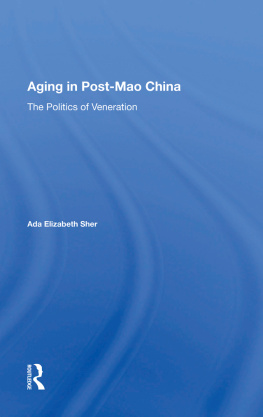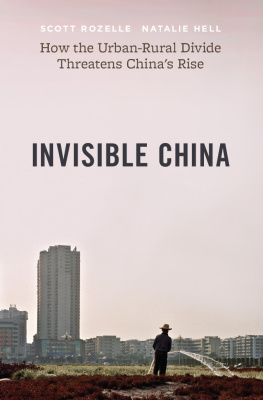Manager Empowerment in China
How have the economic reforms in the post-Mao era led to the spectacular rise of a new group of managerial elites? Who exactly are the members of the elite and can the Communist Party handle them?
China is a country in the midst of rapid economic change, especially in its traditional rural areas. Despite the public ownership of township-village enterprises, managers, many of whom first gained their industrial experience in commune-brigade enterprises in the collective era, are highly motivated. Their entrepreneurial skills and expertise are indispensable for the vitality and success of rural enterprises, while their ascendancy in the local community is reinforced by the growing scale and sophistication of production necessary in the further progress of rural industrialization.
Ray Yep presents detailed persuasive evidence which suggests that, contrary to the ideas of civil society theorists, managers owe their rise to their growing indispensability and not to direct confrontation with the state. Collaboration and negotiation are the managers' dominant strategies in pursuing their interests, and this symbiotic state-manager relationship is evident in the processes of political co-optation, defending autonomy in enterprise operation, and ownership reform of rural enterprise. The in-depth and sophisticated approach of this study suggests that in the post-Mao era rural industrialization depends upon continuity with, as well as departure from, the past in order to develop the state-manager relationship.
Ray Yep is Assistant Professor in the Department of Public and Social Administration at the City University of Hong Kong.
RoutledgeCurzon Studies on China in Transition
Series Editor: David S. G. Goodman
1 The Democratisation of China
Baogang He
2 Beyond Beijing
Dali Yang
3 China's Enterprise Reform
Changing state/society relations after Mao
YouJi
4 Industrial Change in China
Economic restructuring and conflicting interests
Kate Hannan
5 The Entrepreneurial State in China
Real estate and commerce departments in reform era Tianjin
Jane Duckett
6 Tourism and Modernity in China
Tim Oakes
7 Cities in Post Mao China
Recipes for economic development in the reform era
Jae Ho Chung
8 China's Spatial Economic Development
Regional transformation in the Lower Yangzi Delta
Andrew M. Marton
9 Regional Development in China
States, globalization and inequality
Yehua Dennis Wei
10 Grassroots Charisma
Four local leaders in China
Stephan Feuchtwang and Wang Mingming
11 The Chinese Legal System
Globalization and local legal culture
Pitman B. Potter
12 Markets and Clientelism
The transformation of property rights in rural China
Chi-JouJay Chen
13 Negotiating Ethnicity in China
Citizenship as a response to the state
Chih-yu Shih
14 Manager Empowerment in China
Political implications of rural industrialization in the reform era
Ray Yep
Manager Empowerment
in China
Political implications of rural
industrialization in the reform era
Ray Yep
First published 2003
by RoutledgeCurzon
2 Park Square, Milton Park, Abingdon, Oxon OX14 4RN
Simultaneously published in the USA and Canada
by RoutledgeCurzon
711 Third Avenue, New York, NY 10017
RoutledgeCurzon is an imprint of the Taylor & Francis Group
2003 Ray Yep
Typeset in Baskerville by
Prepress Projects Ltd, Perth, Scotland
All rights reserved. No part of this book may be reprinted or reproduced or utilized in any form or by any electronic, mechanical, or other means, now known or hereafter invented, including photocopying and recording, or in any information storage or retrieval system, without permission in writing from the publishers.
British Library Cataloguing in Publication Data
A catalogue record for this book is available from the British Library
Library of Congress Cataloging in Publication Data
A catalog record for this book has been requested
ISBN 0415282950
For Carolin
Contents
Illustrations
Tables
Figure
Preface
This book is the result of a decade of curiosity about rural China. It began when I worked as a researcher for a trading company selling fertilizers to Chinese farmers. The daily routine of intensive reading of several dozen Chinese newspapers exposed me to fascinating stories and episodes of the dramatic changes in the countryside. Although my primary responsibility was to monitor the consumption pattern and grain production in China, my political science training always pulled my attention in a different direction, toward the possible linkage between socioeconomic changes and power relationships in the countryside. Such moonlighting was fun, as I had a substantial pool of corporate resources at my disposal to finance my private research. But it soon became clear that a more serious and disciplined effort was necessary if I really desired more than a journalistic account of rural transformation.
This book is based on my doctoral thesis at Oxford, but this is a shared enterprise. A long list of individuals have provided essential support and contributed to this work. I am particularly indebted to my supervisor, Laurence Whitehead, for his guidance, patience, and encouragement. His probing questions always enabled me to see things in a larger context and to reconsider the issue with references to real-life experience. His genuine concern for humanity demonstrates that academic work can mean more than abstract theorization or egoistic fulfillment, which I think is the most precious lesson I learned during my years at Oxford. I am also grateful to my college supervisor, John Darwin, for his support through the years. His meticulous reading of my works always provoked me to base my argument on solid empirical support and clarity.
A number of people have also unselfishly shared their wisdom with me by commenting on different drafts of my thesis: Robert Bickers, Archie Brown, Jane Duckett, Jacob Eyferth, James Kung, Takwing Ngo, Maria Edin, Stig Thorgensen, Paul Wilding, Ian Holliday, and Federico Varese. I am also grateful for the comments of David Goodman and Frank Pieke. The support of a number of Chinese scholars was indispensable for this project. The field research would simply have been impossible without the intermediation of Chen Xiwen, Du Ying, and Chen Jianbo in particular. I was also graced with the remarkable research assistance provided by Royce Chau, Erica Chu, Vivien Leung, and Jacqueline Yu throughout the years; their steady supply of useful data and materials helped to polish the book. John Swire & Sons, the Cha Fund of St Antony's College, Oxford, and the City University of Hong Kong provided generous funding for my research. The final version of this book was written during my visiting fellowship in the Center of Northeast Asian Policy Studies, Brookings Institution. I am indebted to Mike Armacost, James Steinberg, Catharin Dalpino, and particularly Bates Gill, as they provided me with a wonderful sabbatical year in which to finish the task. I am also grateful for the excellent proofreading support of Angela Stavropoulos and Helen MacDonald. This book would not be possible without the assistance of the outstanding editorial team at RoutledgeCurzon and Prepress Projects Ltd: Annabel Watson, Joe Whiting, Ann Grant, and Rachel Saunders.


